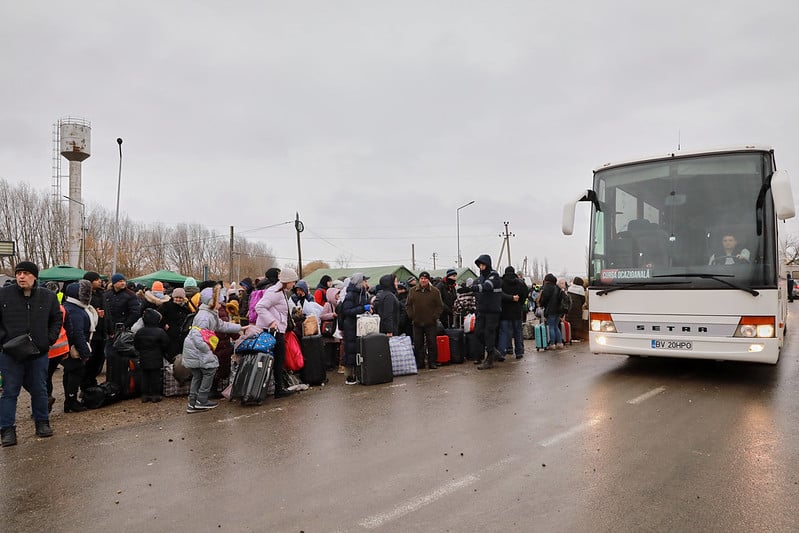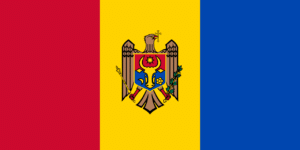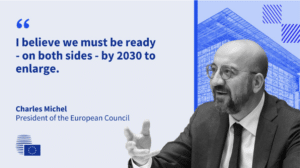A scene from the Palanca-Maiaki-Udobnoe border crossing point, between the Republic of Moldova and Ukraine on March 1, 2022 (Photo: Flickr)
Europe’s poorest country, Moldova, faces a major humanitarian crisis as more than 250,000 Ukrainian refugees have entered the country. Moldova lacks the resources to properly shelter refugees and is in desperate need of international aid. Meanwhile, fears rise over the country’s position in the region, as many fear that Russia’s invasion of Ukraine will also target Moldova.
Humanitarian crisis
At the moment, approximately 4% of Moldova’s population are refugees. According to its foreign minister, Nicu Popescu, the majority of refugees are being sheltered in people’s homes. “We have much fewer resources to deal with that, than any other neighbor of Ukraine,” said Popescu. Moldova needs financial assistance. US, EU, and UN officials have visited the country and ensured financial aid. However, only a small portion of these funds has reached the final destination. Ronald Schilling, the UNHCR’s head of central Europe acknowledges that the Moldavian civil society needs aid to support refugees. Furthermore, U.S. Secretary of State Anthony Blinken has promised 18 million dollars to support the Moldavian energy sector, as the nation faces an energy crisis too. The country is highly dependent on Russian import of gas.
Moldova’s precarious geopolitical position
In Moldova, many worry that the Russian invasion in Ukraine wishes to connect the Moldavian region of Transnistria to the Crimea. This region is considered as pro-Russian and also hosts 1500-2000 Russian troops. In a bizarre event, Belarus’ President Lukashenko even presented an invasion map to his military leaders, which seemed to imply that Russian forces would cross the Moldavian border into the separatist region of Transnistria.
On March 3, President Maia Sandu submitted a formal EU membership application to Brussels. Sandu, running on a pro-Western platform, said that “if some decisions need time, others must be taken promptly and decisively, using the opportunities offered by the changing landscape of the world.” A quick accession of Moldova seems unrealistic – as it will need deep economic, legal and societal reform. Nonetheless, its application shows how deeply threatened the country feels in the region.
The discussion on a possible unification of Moldova with neighboring Romania has also resumed. Both countries share historical ties and some parties in both nations still deeply wish an integration. However, western Europe is reluctant, as it would mean an immediate accession of Moldova into the EU and NATO, which is sure to anger Moscow. According to Moldova’s Prime Minister Gavrilița Romanian accession is not an option, as it “has not been discussed”. She does add that Moldova is “ready to do the homework that is necessary to achieve the standards to join the European Union”.
What will happen in Transnistria?
Political leaders in Transnistria, a province covering Moldova’s eastern border with Ukraine, have always been considered as pro-Russian. However, they still have not announced their recognition of the independence of Donetsk and Luhansk, nor overtly supported the Russian invasion in Ukraine. As a border region, Transnistria still has major commercial and societal ties with Ukraine. In recent years, its de-facto President Vadim Krasnoselsky has tried to balance Russian and Ukrainian interests. While in Georgia, pro-Russian entities Abkhazia and South-Ossetia fully endorse the Russian invasion, Transnistria thus remains hesitant. If Moscow intents to annex Transnistria, this is likely to change. For now, Transnistira rejects Sandu’s EU bid – and subsequently tries to remain neutral.
Moldova as a key actor
For years, Moldova has been economically and politically disregarded by Western leaders. It now appears that the country has become an important actor in Eastern European geopolitics. As Moldova grapples with the influx of Ukrainian refugees, EU leaders must act to prevent a major humanitarian crisis in the country. Geopolitically, Moldova is fragile too. Both from the East as the West, actors seek its integration. Furthermore, the situation in Transnistria remains worrying, especially as Russian forces seek to connect its forces with the region. It is imperative that the EU seriously considers Moldova’s EU bid, acknowledges its independence, and lays out a vision for the future – giving Moldova’s citizens the trust that better times shall lie ahead.
Sources: Euronews I Euronews II Euronews III Global News Middle East Eye Radio Free Europe Al Jazeera Balkan Insight
Photo: UN Women/Aurel Obreja (Flickr)



